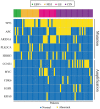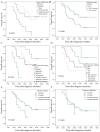Clinical characteristics and prognostic significance of TCGA and ACRG classification in gastric cancer among the Chinese population
- PMID: 32468041
- PMCID: PMC7346591
- DOI: 10.3892/mmr.2020.11183
Clinical characteristics and prognostic significance of TCGA and ACRG classification in gastric cancer among the Chinese population
Abstract
Molecular classifications of gastric cancer (GC) by the Asian Cancer Research Group (ACRG) and The Cancer Genome Atlas Consortium (TCGA) are useful for diagnosis and treatment of GC. However, their clinical significance is unknown. The present study aims to explore the associations between subtypes of GC and prognosis of patients with GC. Immunohistochemistry (IHC) was used in the ACRG molecular classification of GC, while next‑generation sequencing technology was used in TCGA molecular classification. The results indicated that, out of a total of 65 cases of GC, some were classified as Epstein‑Barr virus positive type (9.2%, 6 of 65), some as microsatellite instability (MSI) type (23.1%, 15 of 65), some as gene stable type (21.5%, 14 of 65) and some as chromosome instability type (46.2%, 30 of 65) according to TCGA typing standard. Of the total 65 GC cases, some were classified as MSI (21.5%, 14 of 65), some as microsatellite stable/epithelial‑mesenchymal transition (MSS/EMT; 20.0%, 13 of 65), some as MSS/tumor protein 53 active (TP53+; 15.4%, 10 of 65) and some as MSS/TP53 inactive (43.1%, 28 of 65) according to ACRG typing standard. ARCG molecular subtype (P=0.010) and Lauren classification (P=0.011) were independently correlated with the overall survival of patients with GC. In conclusion, TCGA classification based on a Chinese population is the same as TCGA typing based on a European population in terms of proportion and clinical characteristics, but there are differences in gene amplification and gene mutation. ACRG molecular classification could be performed by IHC analysis and may be a valuable independent prognostic marker for patients with GC.
Keywords: gastric cancer; Asian Cancer Research Group; The Cancer Genome Atlas Consortium; next‑generation sequencing; immunohistochemical staining; prognosis.
Figures






Similar articles
-
Molecular Classifications in Gastric Cancer: A Call for Interdisciplinary Collaboration.Int J Mol Sci. 2024 Feb 24;25(5):2649. doi: 10.3390/ijms25052649. Int J Mol Sci. 2024. PMID: 38473896 Free PMC article. Review.
-
Reproduction of the Cancer Genome Atlas (TCGA) and Asian Cancer Research Group (ACRG) Gastric Cancer Molecular Classifications and Their Association with Clinicopathological Characteristics and Overall Survival in Moroccan Patients.Dis Markers. 2021 Jul 28;2021:9980410. doi: 10.1155/2021/9980410. eCollection 2021. Dis Markers. 2021. PMID: 34367379 Free PMC article.
-
Immunohistochemical-Based Molecular Typing of ACRG Combined With Immune-Associated PD-L1 Expression Can Predict the Prognosis of Gastric Cancer.Cancer Med. 2025 Apr;14(7):e70863. doi: 10.1002/cam4.70863. Cancer Med. 2025. PMID: 40202155 Free PMC article.
-
Molecular subtyping of gastric cancer according to ACRG using immunohistochemistry - Correlation with clinical parameters.Pathol Res Pract. 2022 Mar;231:153797. doi: 10.1016/j.prp.2022.153797. Epub 2022 Feb 7. Pathol Res Pract. 2022. PMID: 35151032
-
Molecular classification of gastric cancer.Ann Oncol. 2016 May;27(5):763-9. doi: 10.1093/annonc/mdw040. Epub 2016 Feb 9. Ann Oncol. 2016. PMID: 26861606 Review.
Cited by
-
Increasing frequency of gene copy number aberrations is associated with immunosuppression and predicts poor prognosis in gastric adenocarcinoma.Br J Surg. 2022 Feb 24;109(3):291-297. doi: 10.1093/bjs/znab460. Br J Surg. 2022. PMID: 35179206 Free PMC article.
-
Dissecting the Role of Immune Checkpoint Regulation Patterns in Tumor Microenvironment and Prognosis of Gastric Cancer.Front Genet. 2022 Apr 19;13:853648. doi: 10.3389/fgene.2022.853648. eCollection 2022. Front Genet. 2022. PMID: 35518357 Free PMC article.
-
Molecular Classifications in Gastric Cancer: A Call for Interdisciplinary Collaboration.Int J Mol Sci. 2024 Feb 24;25(5):2649. doi: 10.3390/ijms25052649. Int J Mol Sci. 2024. PMID: 38473896 Free PMC article. Review.
-
Prognostic effect of immunohistochemically determined molecular subtypes in gastric cancer.BMC Cancer. 2024 Dec 2;24(1):1482. doi: 10.1186/s12885-024-13236-z. BMC Cancer. 2024. PMID: 39623302 Free PMC article.
-
Screening of Differentially Expressed Genes Based on the ACRG Molecular Subtypes of Gastric Cancer and the Significance and Mechanism of AGTR1 Gene Expression.J Pers Med. 2023 Mar 20;13(3):560. doi: 10.3390/jpm13030560. J Pers Med. 2023. PMID: 36983741 Free PMC article.
References
MeSH terms
Substances
LinkOut - more resources
Full Text Sources
Medical
Research Materials
Miscellaneous

